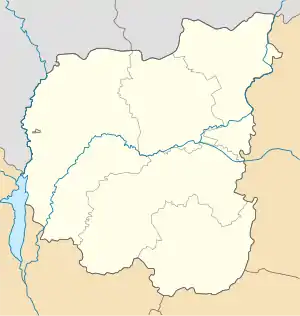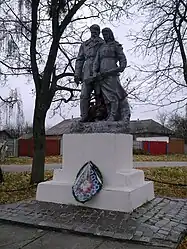Mochalyshche
Мочалище | |
|---|---|
Village | |
 Mochalyshche | |
| Coordinates: 50°33′59″N 31°19′25″E / 50.56639°N 31.32361°E | |
| Country | Ukraine |
| Oblast | Chernihiv Oblast |
| Raion | Nizhyn Raion |
| Hromada | Nova Basan rural hromada |
| KOATUU[1] | 7420687404 |
| KATOTTH[2] | UA74040270070072839 |
| Founded | By 1781 |
| Burnt down | 18 December 1942 |
| Resettled | By 1978 |
| Administrative centre | Nova Basan |
| Area | |
| • Total | 0.808 km2 (0.312 sq mi) |
| Elevation | 114 m (374 ft) |
| Population (2012)[3] | |
| • Total | 141 |
| • Density | 174.5/km2 (452/sq mi) |
| Native language (2001) | |
| • Ukrainian | 97.16% |
| • Russian | 2.84% |
| Postal code | 17454 |
| Area code | +380 4632 |
Mochalyshche (Ukrainian: Мочалище) is a village in Nizhyn Raion of Chernihiv Oblast, Ukraine. It belongs to Nova Basan rural hromada.[6][7]
History

It is unclear when exactly Mochalyshche was established. Information published by the Ukrainian Verkhovna Rada attests to its founding by the first decade of the 1800s.[3] The village was likely founded during the Hetman administration, with the oldest mention of the village dating to the 1781 index of the Kievan viceroyalty, mentioning a village of 4 pospolite households named Mochalinskom (Russian: Мочалинскомъ), in Basan Stonia, Pereyaslav Regiment.[8]:97 Its first emergence on a map was in 1801, appearing in the Russian Empire's Stolistovaya Karta (Russian: Столистовая карта, meaning "100-sheet map").[9]
Under the administration of the Kievan viceroyalty, and the later Chernigov Governorate, Mochalyshche was in the third Stan of Kozeletsky Uyezd; in Yaroslavl Volost.[8]:97[10][11]
The village was recorded in the 1866 Russian Empire's list of settlements.[10] It was documented as comprising 22 homesteads housing a population of 181, whose water supply came from local wells.[10] The 1902 list of inhabited places of the Chernigov Governorate mentions that by then the village's population had grown to 538.[11]
In 1919, during the Ukrainian War of Independence, a Petliurite insurrection against the White Army broke out in Kozeletsky Uyezd, led by Ataman Romashka Demid Ostapovich.[12] During this time, an armistice was in effect between the Petliurites and the Red Army, and they co-operated in order to disrupt Denikinite hegemony in Ukraine.[12] After the White Army was expelled from the region in early 1920, Romashka's forces gained control over Mochalyshche and the rest of southern Kozeletsky Uyezd by resuming the fight against the Soviets.[12][13] After continued fighting against the Red Army, the last of Romashka's forces were defeated on 16 May 1920 by the Bashkir Cavalry Brigade;[12] Romashka managed to escape, but was later killed on 8 July by his godfather and compatriot, Stepan Shuplik, a native of Mochalyshche who acted as a double-agent for the Ukrainian Cheka.[12][13][14]
During World War II, Mochalyshche was razed as part of Nazi punitive expedition against local partisan activity. The village was burnt to the ground on 18 December 1942, resulting in the death of 267 civilians.[15]:28
The village was reportedly resettled by 1978, as it was documented in a Soviet General Staff map of the area surrounding Kiev.[16][note 1] Following Mochalyshche's resettlement, the 1989 Soviet census reported a population of 145.[17]
Mochalyshche was under the administration of Sokolivka rural council in Bobrovytsia Raion until 2020;[3][18] Administrative reforms in Chernihiv Oblast in June led to the merger of Sokolivka rural council with several other rural councils, including those of Nova Basan, Bilotserkivtsi, Vepryk, Voronky, and Novyi Bykiv, forming Nova Basan rural hromada.[19]:2-3 Subsequent national administrative reform in July led to the merging of Bobrovytsia Raion with other districts to form the new Nizhyn Raion.[20]
Demographics
Demographic statistics published by the Ukrainian Verkhovna Rada show that as of 2012 the population of Mochalyshche was 141 people.[3] Between the 2001 Ukrainian Census and 2012, the population increased by 0.7%, or one resident.[21] However, since 1989, the population has declined by 2.76%, or four residents.[17]
Language
According to the 2001 Ukrainian census, Ukrainian was the native language of 97.16% of the village's population, or 136 residents. Russian was the native language of the remaining portion of the population, who accounted for 2.84%, or 4 residents.[5]
Notable people
- Anatolii Pohribnyi, a Ukrainian politician, writer, and philologist.[22][23][24]:67-80
- Stepan Maximovich Shuplik, a Ukrainian poet,[14][25]:13 Soviet partisan,[26]:202-204 and former agent of the All-Ukrainian Extraordinary Commission.[12][13]
Notes
- ↑ Although this edition dates to 1981, the map specifies it was compiled according to an earlier 1964–1965 edition with additional corrections according to cartographic materials from 1974–1978.
References
- ↑ "Mochalyshche 105" Мочалище 105. Heoportal administratyvno-terytorialnoho ustroyu Ukrayiny Геопортал адміністративно-територіального устрою України [Geoportal of administrative-territorial structure of Ukraine] (in Ukrainian). Ministry of Communities and Territories Development of Ukraine / State Service of Ukraine for Geodesy, Cartography and Cadastre. Retrieved 22 February 2022.
- ↑ "Mochalyshche - Chernihivska oblast" Мочалище - Чернігівська область. decentralization.gov.ua (in Ukrainian). Retrieved 22 February 2022.
- 1 2 3 4 5 "Oblikova kartka: selo Mochalyshche - Chernihivska oblast, Bobrovytskyy rayon" Облікова картка: село Мочалище - Чернігівська область, Бобровицький район [Account card: Mochalyshche village - Chernihiv Oblast, Bobrovytsia Raion]. Verkhovna Rada of Ukraine (in Ukrainian). 4 December 2012. Archived from the original on 28 January 2019. Retrieved 28 March 2022.
- ↑ "Pohoda v v. Mochalyshche (Chernihiv oblast, Bobrovytskyy rayon)" Погода в v. Мочалище (Chernihiv область, Бобровицький район) [Weather in v. Mochalyshche (Chernihiv Oblast, Bobrovytsia Raion)]. weather.in.ua. Retrieved 22 February 2022.
- 1 2 "Table: 19A050501_02_074. Distribution of the population by native language, Chernihivska oblast (1,2,3,4)". database.ukrcensus.gov.ua. Retrieved 20 March 2018.
- ↑ "2.2 Administratyvno-terytorialnyy ustriy Chernihivskoyi oblasti: 3. Naseleni punkty Chernihivskoyi oblasti. Rayony" 2.2 Адміністративно-територіальний устрій Чернігівської області: 3. Населені пункти Чернігівської області. Райони [2.2 Administrative-territorial structure of the Chernihiv region: 3. Settlements of Chernihiv region. Raions]. Verkhovna Rada of Ukraine (in Ukrainian). Retrieved 2 March 2022.
- ↑ "Novobasanska hromada - Bobrovytskyy rayon, Chernihivska oblast" Новобасанська громада - Бобровицький район, Чернігівська область. gromada.info (in Ukrainian). Ministry of Communities and Territories Development of Ukraine. Retrieved 21 June 2022.
- 1 2 Bolotova HV, et al. (1989). Opysy Kyyivskoho namisnytstva 70-80 rokiv XVIII stolittya Описи Київського намісництва 70-80 років XVIII ст. [Index of the Kievan viceroyalty of the 70-80s of the XVIII century] (PDF) (in Ukrainian and Russian). Kyiv: Naukova Dumka. ISBN 5120006566. Retrieved 8 April 2022 – via Mykhailo Hrushevsky Institute of Ukrainian Archaeography.
- ↑ Podrobnaya karta Rossiyskoy imperii i blizlezhashchikh zagranichnykh vladeniy Подробная карта Российской империи и близлежащих заграничных владений [Detailed map of the Russian Empire and nearby foreign possessions] (Map). 1:840000 (in Russian). Saint Petersburg: His Imperial Majesty's Own Map Depot. 1816 [First published 1801-1804]. Retrieved 9 July 2018.
- 1 2 3 Spiski naselennykh mest Rossiyskoy imperii Списки населенных мест Российской империи [Lists of settlements of the Russian Empire] (in Russian). Saint Petersburg: the Central Statistical Committee of the Ministry of Internal Affairs of the Russian Empire. 1866. p. 65. Retrieved 16 July 2018 – via State Historic Public Library of Russia.
- 1 2 Spisok naselennykh mest Chernigovskoy gubernii, imeyushchikh ne meneye 10 zhiteley, po dannym za 1901 god Список населенных мест Черниговской губернии, имеющих не менее 10 жителей, по данным за 1901 год [List of inhabited places of the Chernigov governorate, with at least 10 people, according to data from 1901] (in Russian). Chernihiv: Chernihiv Provincial Statistical Committee. 1902. p. 107. Retrieved 16 August 2018 – via State Historic Public Library of Russia.
- 1 2 3 4 5 6 Yasenchuk, Oleksandr (28 February 2011). "Livoberezhni povstantsi Kyyivshchyny i Chernihivshchyny: yikh porivnyuvaly z Makhnom" Лівобережні повстанці Київщини і Чернігівщини: їх порівнювали з Махном [The left bank rebels of Kyiv and Chernihiv Oblasts: Their past comparison to Makhno]. Istorychna Pravda (in Ukrainian). Ukrayinska Pravda. Retrieved 8 April 2022.
- 1 2 3 Holovko, Dmytro (December 2011). "Slovo pro ridnu zemlyu" Слово про рідну землю [The word of the native land] (PDF). Otchyi porih Отчий поріг (in Ukrainian). Vol. 12, no. 120. Kyiv: Chernihiv Community Fellowship. p. 16. Retrieved 8 April 2022.
- 1 2 Shuplik, Stepan (1945). Pisni partyzana dida Stepana. 1941–1943 Пісні партизана діда Степана. 1941–1943 [Partisan songs by grandfather Stepan. 1941–1943] (PDF) (in Ukrainian). Kyiv: Ukrainian State Publishing House. p. 3. Retrieved 21 April 2022 – via eScriptorium.
- ↑ Butko SV, Lisenko OV, Pilavec RI, et al. (2013). Spaleni sela i selyshcha Chernihivshchyny v 1941–1943 rokakh: zlochyny proty tsyvilnoho naselennya – Zbirnyk dokumentiv i materialiv Спалені села і селища Чернігівщини в 1941–1943 роках: злочини проти цивільного населення – Збірник документів і матеріалів [Burned villages and settlements of Chernihiv Oblast 1941–1943: crimes against civilians – a collection of documents and materials] (PDF) (in Ukrainian). Chernihiv: Desna Polygraph. ISBN 9789662646436. Archived from the original (PDF) on 4 March 2022. Retrieved 8 April 2022.
- ↑ General Staff of the Soviet Armed Forces. Topograficheskiye karty Genshtaba, List M-36-A, Kiev Топографические карты Генштаба, Лист M-36-А, Киев [Topographic Maps of the General Staff, Sheet M-36-A, Kiev] (Map) (1981 ed.). 1:500000 (in Russian). Retrieved 28 March 2022 – via varvar.ru.
- 1 2 "Table: 19A0501_061_074. Number of actual and permanent population in rural areas, Chernihivska oblast (1,2,3,4)". database.ukrcensus.gov.ua. Retrieved 16 March 2018.
- ↑ "SOKOLIVSKA SILSKA RADA – Bobrovytskyy rayon, Chernihivska oblast" СОКОЛІВСЬКА СІЛЬСЬКА РАДА – Бобровицький район, Чернігівська область [Sokolivka rural council – Bobrovytsia Raion, Chernihiv Oblast]. rada.info (in Ukrainian). Retrieved 4 April 2021.
- ↑ "Pro vyznachennya administratyvnykh tsentriv ta zatverdzhennya terytoriy terytorialnykh hromad Chernihivskoyi oblasti" Про визначення адміністративних центрів та затвердження територій територіальних громад Чернігівської області [On defining administrative centres and approving territories of hromadas in Chernihiv Oblast]. Regulation No. 730-р Ind. 82 of 12 June 2020 (in Ukrainian). Cabinet of Ministers of Ukraine.
- ↑ "Pro utvorennya ta likvidatsiyu rayoniv" Про утворення та ліквідацію районів [On formation and liquidation of Raions]. Ordinance No. 807-IX of 17 July 2020 (in Ukrainian). Verkhovna Rada of Ukraine.
- ↑ "Table: 19A0501_07_074. Number of actual population in rural areas, Chernihivska oblast (1,2,3,4)". database.ukrcensus.gov.ua. Retrieved 20 March 2018.
- ↑ Kudrin, Oleg (3 January 2017). ""Yakby my vchylys tak, yak treba"... Plomenem Pohribnoho" "Якби ми вчились так, як треба"... Пломенем Погрібного ["If we studied the way we should"... The Pohribnyi flame] (in Ukrainian). Kyiv. Ukrinform. Retrieved 21 July 2018.
- ↑ Tumanova, Tony (3 October 2011). "Komitet Verkhovnoyi Rady proponuye vidznachyty na derzhrivni 70-richchya z dnya narodzhennya publitsysta A.Pohribnoho" Комітет ВР пропонує відзначити на держрівні 70-річчя з дня народження публіциста А.Погрібного [Verkhovna Rada committee proposes to mark the 70th anniversary of the birthday of the publicist A. Pohribnyi at the state level]. Ukrainian National News (in Ukrainian). Retrieved 16 August 2018.
- ↑ Solchanyk, Roman, ed. (1992). "The Democratization Process in Ukraine: An Interview with Anatolii Pohribnyi". Ukraine: From Chernobyl to Sovereignty, A Collection of Interviews (PDF). New York: St. Martin's Press. ISBN 978-0-312-07549-1 – via Chtyvo.
- ↑ Konechna, Olena (2014). "Literaturna Chernihivshchyna: vid syvoyi mynuvshyny do nashykh dniv" Літературна Чернігівщина: від сивої минувшини до наших днів [Literature of Chernihiv: From the ancient past to the present day] (PDF). Sobornist Соборність (in Ukrainian). No. 1–2. Israel: Oleksandr Deko. ISSN 1565-6837. Retrieved 4 April 2021 – via Diasporiana.
- ↑ Fedorov, Oleksiy (1952). The Underground Committee Carries On. Moscow: Foreign Languages Publishing House. Retrieved 16 August 2018 – via Internet Archive.
External links
- Weather in Mochalyshche
- Mochalyshche in the First French Empire's "Carte de la Russie Européenne en LXXVII feuilles exécutée au Depôt general de la Guerre" [Map of European Russia in 77 sheets carried out by the Depôt General de la Guerre] (1812)
- Mochalyshche in Ivan Afanasyevich Strelbitsky's map of European Russia (1871)
- Mochalyshche in the Kiev Governorate's "Karta Shuberta" [Map of Schubert] (1893)
- Mochalyshche in a topographic military map of the Red Army (1941)